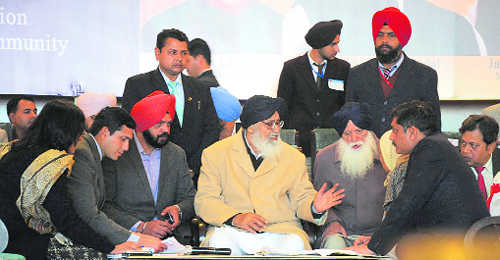British Punjabis catch election fever
With electioneering underway in right earnest in Punjab, there’s a gradually enlarging debate among Punjabis in Britain about the prospects and which formation they should endorse. In fact, non-residents – as opposed to those who’ve switched to British nationality –are entitled to exercise their franchise, if they have registered as voters and are present in their home towns or villages on the day of the polls.
A quarter of a century ago, the Indian Overseas Congress (IOC) was the most active organisation in the UK. The scene has metamorphosed dramatically since, with the Overseas Friends of the BJP (OFBJP) now the best resourced and with a wide following, though not necessarily among Punjabis.
After a long time, the IOC sounds upbeat. “I think the Congress has a good chance of winning,” the president of its London faction, Darshan Lal Kalhan exuded. “There is so much resentment with the Akali Dal and the BJP,” he asserted.
He also believes the Indian Supreme Court judgement banning the use of religion in elections will hamper the Akali Dal. The IOC is discussing within itself whether – as in the past – it will dispatch members to work for the Congress in districts of their origin, which are, among others, Jalandhar, Ludhiana, Hoshiarpur and Kapurthala.
Immigrant Sikhs constitute a majority among Punjabis in Britain. Therefore, in west London and the West Midlands of England - where they are mainly settled - the bodies linked to Indian political parties are perforce Sikh-oriented, with considerable support for the Akali Dal.
Indeed, when Indira Gandhi, then in opposition, visited the UK in 1978 at the invitation of the IOC, it didn’t go unnoticed that the Akalis dressed in black, waving flags of the same colour demonstrated outside London’s Heathrow airport. Protests triggered by the Akalis also erupted at her rallies in the London suburb of Southall and in Birmingham.
An intelligence officer – who did not wish to be identified – said conservative Sikhs root for the Damdami Taksal or Babbar Khalsa, while militants are inclined towards the Sikh Youth Federation, who remain pro-Khalistan and anti-India and on whom British authorities keep a close eye.
In general, barring a minority of progressive temples, Gurdwaras, politically identify with the Akalis, with moderates among them historically sympathetic to the SAD faction. But SAD’s popularity seems to have waned. This, interestingly, has more to do with their reported reservations about the current Punjab CM’s son Sukhbir Badal.
Intriguingly, the sense of satisfaction among community leaders is related to being received by and photographed with the powers-that-be in Punjab and publicising such meetings on British Indian media to acquire or increase their local clout. The narrative goes Sukhbir has not devoted much time to such photo ops – thereby losing favour!
Gurmail Singh Malhi, the elected head of the committee overseeing Southall’s magnificent gold-domed Gurdwara, cautiously states that the situation was “complex” and not easy to forecast. The issue for him was the 1984 riots and the alleged “lack of justice” connected with it.
Malhi was among a group of Sikhs who met Narendra Modi when he visited London in November 2015. He maintains Modi promised swift relief for UK-based Sikhs who are on the Indian government’s blacklist or cannot return home, because they sought political asylum in Britain, thereby denigrating India. “While this is happening bit by bit, it has not happened with the speed promised by Modi,” Malhi claimed.
Elections in Punjab are an issue with two opposites - the older generation and those who have arrived recently. In effect, what was previously a choice between the Congress and SAD has now enlarged into a four-way option, with the Aam Aadmi Party UK (AAPUK) and the OFBJP entering the arena of activism.
In the anti-Congress atmosphere of 2014, AAPUK became a beneficiary among an idealistic section seeking probity in public life. AAP’s impressive debut in Punjab in 2014 followed by a sweep in Delhi enhanced its credentials, not to mention contributions to its coffers. Even a year ago, AAP posters were prominent in shops in Southall – Greater London's “Little Punjab”.
Such promotion appears to have faded, though. AAP’s apparently agitational approach is said to have disillusioned some of its admirers. However, AAPUK has painted a van with a torch (with an actual one inside) and a sign proclaiming “Flame of Hope for Punjab”. AAPUK’s spokesman Sandeep Bisht said the vehicle is travelling through various places in the Midlands and will reach London on January 22, two days before 250 volunteers fly to Punjab to campaign and hand over the torch to the Delhi chief minister Arvind Kejriwal.
The OFBJP is Gujarati dominated but Modi’s projection in the media has helped it penetrate Punjabis in Hounslow, near London, among other boroughs.
Successful British businessmen from Punjab are magnets for Indian political parties. Whether it was Zail Singh or Badal, not to mention Harkishen Singh Surjeet of the CPI (M), they have acted as lubricants. With its rise, the BJP, despite never being predominant in Punjab, has not lost out, either.
There was possibly a time when a Punjabi aspiring to emigrate would be impressed by his overseas brethren. The latter might even have enjoyed a certain influence over his relative or friend back home.
However, 25 years after the landmark economic reforms, such a phenomenon is a diminished factor. It is, therefore, hardly surprising that Sukhbir Badal has less time for overseas Punjabis than his father.
(The writer is a London-based journalist)










